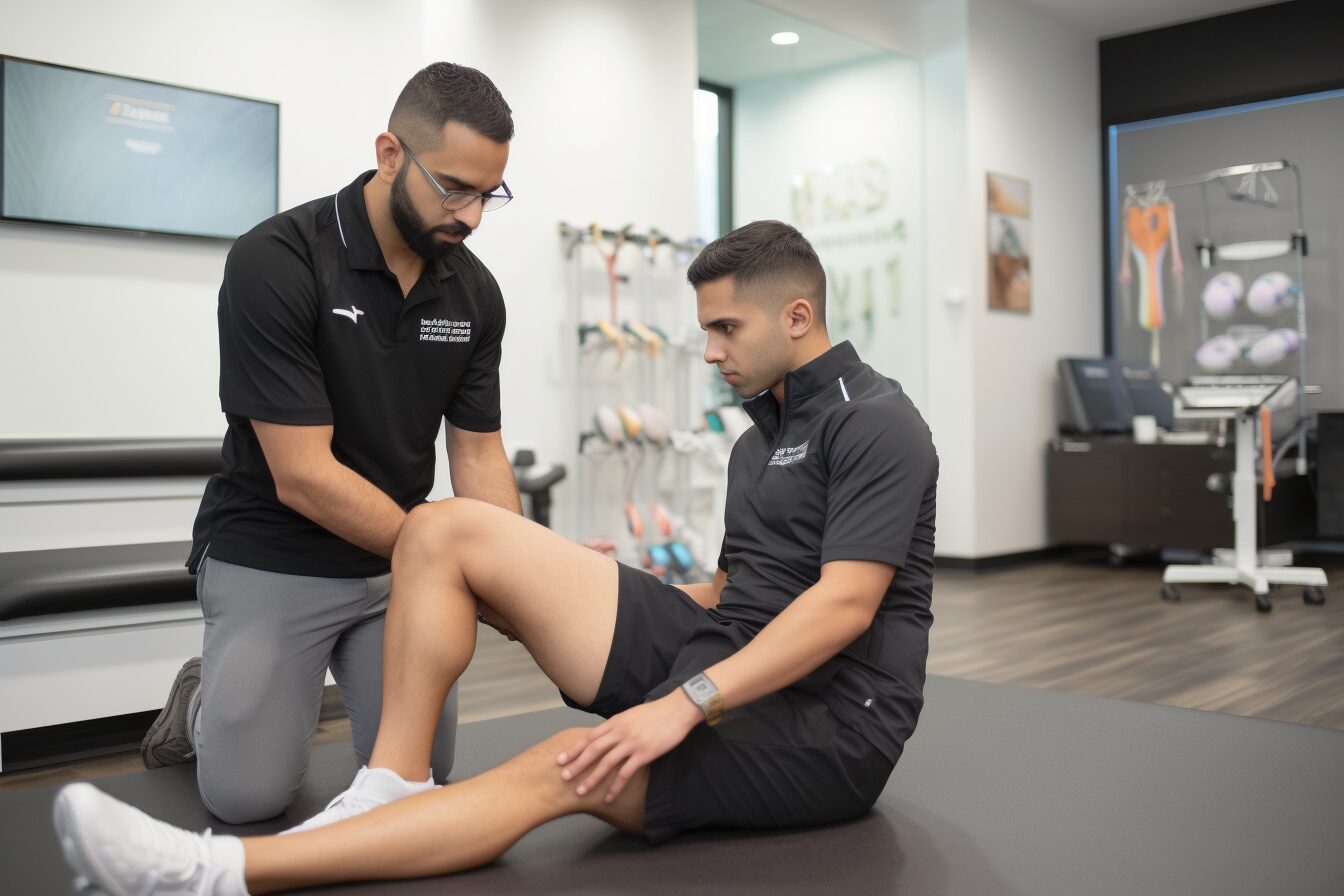Practical Guide: How to Stop Cracking Your Neck Safely
Let's face it, wondering how to stop cracking your neck can be as persistent as a morning alarm you just can't snooze. It starts with a slight stiffness and before you know it, you're tilting and twisting in search of that satisfying pop. But here's the twist: constantly giving into this temptation might do more harm than good.
In these lines, we dive deep into what happens when those pops echo through the corridors of your cervical spine. From understanding the mechanics behind those sounds to exploring risks like pinched nerves or strained muscles – we've got it covered. And because knowledge alone won't straighten things out, we'll walk you through actionable steps; from embracing chiropractic care to mastering exercises that promise relief without repercussions.
Say goodbye to guesswork and hello to grounded guidance on maintaining neck health minus the cracks.
Understanding the Mechanics of Neck Cracking

What Makes That Cracking or Popping Sound?
Ever wondered what's behind that satisfying pop when you twist your neck? The essence of that snap or crackle lies in the fascinating mechanics of joint capsules. These fluid-filled sacs surround your neck joints, acting as a cushion for bone movement. When you crack your neck, pressure within these capsules decreases rapidly.
This sudden change causes some of the gas dissolved in the fluid to turn into bubbles—a process known scientifically as cavitation. The formation and collapse of these gas bubbles produce that well-known cracking sound. It’s not bones grinding against each other but rather a physical reaction occurring within the joint capsule itself.
If you're curious about seeing this phenomenon in action, researchers have captured real-time visualization of joint cavitation, providing fascinating insight into what happens inside our bodies during this common occurrence.
The Immediate Effects on Neck Joints
The instant gratification from hearing that pop might feel good, but it's essential to consider its immediate effects on your cervical spine—the fancy term for your neck region composed mainly of vertebrae and facet joints supporting your head's weight and facilitating motion.
Cavitation doesn't just stop at making sounds; it alters pressures inside the joint capsule momentarily. This can temporarily relieve feelings of tightness or increase mobility by allowing connective tissues like ligaments and muscles around those joints more freedom to move without pain or stiffness.
But, while the occasional self-adjustment might seem like an easy fix at first—especially if it's done correctly—it's vital to avoid making this a habit. This is because frequent self-manipulation can lead to serious health issues down the line, such as osteoarthritis from over-stretching or damage to surrounding blood vessels due to using too much force in search of temporary relief.
These practices often overlook the root causes of discomfort, leading people into a cycle of seeking quick fixes rather than addressing their symptoms with proper care. Hence, it brings to light the necessity of consulting experts for ongoing discomfort.
Key Takeaway:
Neck cracking might give quick relief by increasing mobility and reducing tightness, but it's not a fix-all. Doing it too often can lead to serious issues like osteoarthritis or damage to surrounding tissues. Always seek professional help for persistent pain instead of relying on self-adjustment.

Subscribe To Dr Mike's MVP Newsletter!
Exclusive content, interesting topics, real insights.

Risks Associated with Frequent Neck Cracking
Pinching Nerves and Straining Muscles
One significant risk from constant neck popping is pinched nerves. Jerking your neck around can throw off the alignment of your neck bones, putting pressure on surrounding nerves. This not only causes discomfort but can lead to long-term nerve damage if left unchecked.
Besides nerve issues, straining muscles around your neck area becomes almost inevitable with frequent cracking. Your muscles work hard to support your head daily; twisting them into unnatural positions repeatedly puts undue stress on these structures leading to chronic pain and stiffness over time.
Osteoarthritis: A Long-Term Consequence
Frequent self-manipulation of the neck joints also raises the risk for osteoarthritis—a type of arthritis characterized by wear-and-tear of cartilage covering bone ends within joints called facet joints.
By constantly forcing these joints beyond their normal range, we accelerate their degeneration, inviting perpetual instability and reduced mobility. Imagine wearing out a hinge through excessive use; similarly, our neck bones suffer when subjected regularly to such stresses.
To add injury upon injury, studies have shown that aggressive manipulation techniques might even cause vertebral artery dissection—an alarming condition where blood vessels supplying blood back towards the brain tear due to repeated trauma causing internal bleeding which could potentially lead to a stroke or other serious health complications (learn more about vertebral artery dissection here).
While rare, understanding its possibility emphasizes why adopting safer approaches towards managing tension or discomfort is critical rather than resorting to immediate yet temporary relief methods like cracking one’s own neck.
A Word on Perpetual Instability
Ligaments are connective tissues binding bones together at joints ensuring stability during movement—think rubber bands keeping everything tight while allowing flexibility needed for motion control. Their resilience though isn’t infinite.
Repeatedly stretching ligaments past limits seeking cracks weakens them resulting in diminished support around vertebrae. Over time, a cycle develops of looseness and further attempts to adjust position, feeling unstable without realizing contributing factors exacerbating the problem. Fundamentally, this forms a harmful loop that undermines the integrity and performance of the backbone, underscoring why it's vital to keep correct alignment and steer clear of overburdening these essential pillars.
Key Takeaway:
Cracking your neck can feel good but often leads to nerve pinching, muscle strain, and even osteoarthritis. It's a risky habit that can cause long-term damage like nerve issues, chronic pain, and reduced mobility. Safer ways to manage tension are key for health.
Preventive Measures Against Neck Cracking

Embracing Chiropractic Care for Relief
If you constantly feel the need to crack your neck, it's a signal that something deeper might be at play. Before you turn into a human percussion instrument with every tilt of your head, consider seeking professional chiropractic care. Addressing the symphony of snaps and crackles is merely scratching the surface; it's essential to unearth and tackle the underlying issue.
Through a mix of adjustments and manipulations, chiropractors target the spine and neck areas to address discomforts, going beyond mere temporary fixes. But more than just offering immediate relief, they dive deep into your lifestyle habits—like poor posture—that may contribute to your urge to self-manipulate.
The benefits of chiropractic care extend beyond just minimizing neck pressure or alleviating chronic pain. Regular sessions can improve overall joint health, reducing the risk of joint damage over time. Plus, having someone who knows their way around a cervical spine is reassuring when you're trying not only to stop cracking but also prevent potential neck injury down the line.
Exercises and Stretches for Maintaining Neck Health
Moving away from being DIY chiropractors requires some effort but trust me—it pays off. Tight muscles are often the culprits behind that irresistible urge to twist until something goes 'pop'. Relieving tension doesn’t always have to end in audible satisfaction though; certain exercises targeting deep-neck muscles provide long-term support without risking further discomfort or injury.
Incorporating specific stretches designed by physical therapists into daily routines strengthens connective tissue surrounding cervical vertebrae while promoting flexibility - goodbye stiffness hello smooth movements.
A simple yet effective routine involves gentle head nods (imagine agreeing with everything), side-to-side rotations (like shaking your head 'no'), and shoulder shrugs (as if saying "I don't know"). Each movement should be performed slowly and controlled to minimize strain on those precious cervical spine areas.
Lifestyle Adjustments That Complement Your Routine
Last but definitely not least are lifestyle changes working hand-in-hand with physical routines to fortify defenses against unwanted cracks and pops plaguing our poor necks. This means evaluating how we sit at desks all day—is our monitor eye level? Are we taking frequent breaks?
We've heard it before, but incorporating moderate weight lifting into weekly regimens isn’t just bro-science—it strengthens muscle. By adding this activity to your routine, you're not only building strength but also enhancing overall physical health in a way that's backed by real science. Alright, it's time to pick up those weights and kick off a journey towards healthier changes.
Key Takeaway:
Before you crack your neck again, think twice. Professional chiropractic care and targeted exercises can not only stop those pops but tackle the root causes. Regular check-ups and stretches keep joints healthy, avoiding risks like pinched nerves or worse. Say hello to better posture and goodbye to self-manipulation. Strengthen your neck with simple exercises like head nods, side rotations, and shoulder shrugs to avoid pain and improve posture. Complement these moves with lifestyle changes such as proper desk setup and regular breaks for long-term health benefits.
Professional Help Beyond Chiropractic Care

When neck cracking becomes more than just a habit and ventures into the realm of necessity due to chronic pain or discomfort, it's time to consider additional professional help. Let’s explore how physical therapists and orthopedic surgeons can play pivotal roles in your journey toward better neck health.
Physical Therapy Options
Skilled in crafting tailored regimens, physical therapists adeptly alleviate stress sans the necessity for abrupt adjustments. They focus on exercises that target not only the superficial muscles but also those deep neck muscles often overlooked by standard stretching routines. By fortifying these regions, you alleviate neck tension and diminish the compulsion to pop your neck, thereby averting possible harm to your joints.
A session with a physical therapist might involve using moderate weight exercises to improve overall muscle balance around the cervical spine. This approach helps alleviate undue strain on any single part of your neck which could be causing pain or leading you to constantly feel like you need to crack it for relief.
Consulting Orthopedic Surgeons
In cases where an underlying condition is suspected—be it from repetitive injury, arthritis, or unusual symptoms—it might become necessary to consult an orthopedic surgeon. These healthcare providers specialize in issues related directly to bones, joints called facet joints in terms of our discussion here today about cracking sounds in one's own body - particularly including surrounding tissues such as ligaments that stretch too far resulting in hearing popping noises akin to bubbles forming then bursting inside soda bottle when opened after shaking vigorously.
An orthopedic surgeon will evaluate if there's structural damage within your cervical spine contributing towards this sensation needing a "crack" open space between each vertebra; they may recommend imaging tests to determine the severity issue before discussing possible treatment options ranging from minimally invasive procedures up through surgery depending upon what findings reveal during examination process itself.. It’s important to note that the majority of people experiencing occasional 'cracks' don't necessarily require drastic measures – yet understanding the cause behind the phenomenon certainly aids in making informed decisions regarding future care strategies moving forward..
Key Takeaway:
When neck cracking stems from pain, not just habit, look beyond chiropractic care. Physical therapists can tailor exercises to ease tension without cracking, while orthopedic surgeons check for underlying conditions that may need more advanced treatment.
FAQs in Relation to How to Stop Cracking Your Neck
Why do I constantly feel the need to crack my neck?
This urge often stems from tension or stiffness. Your body's craving relief, seeking a quick fix through cracking.
How do I get my neck to stop cracking?
Focusing on improving posture and strengthening your neck muscles can significantly reduce involuntary cracks.
How do I get rid of the crunching sound in my neck?
Gentle stretches and proper hydration can ease tightness, lessening those crunching sounds over time.
Why does my neck crackle when I turn my head?
Tight muscles or gas bubbles escaping your joints are likely culprits for that crackling sound during movement.
Conclusion
Cracking your neck feels good, momentarily. But we've learned the risks outweigh that brief relief. Exploring the depths of neck-cracking revealed its fleeting pleasure is overshadowed by considerable dangers, urging a reevaluation of this common yet risky practice.
To stop cracking your neck takes understanding and action. Now you're clued up about the snap, crackle, and possible ouch from tweaking your neck too much—think squished nerves to worn-out joints.
Change starts with embracing chiropractic care or consulting healthcare providers for deeper issues. Exercises designed to strengthen deep neck muscles promise long-term relief without risking damage.
Remember, every pop is not just noise; it could be a cry for help from strained muscles or compromised joints. Listen closely, and respond wisely.
18600 Main St STE 110, Huntington Beach, CA 92648

Subscribe To Dr Mike's MVP Newsletter.
Get In Touch
(714) 794-2171
Office Hours
Monday-Thursday:
7:00 am - 11:00 am, 2:00 pm - 6:00 pm
Friday: Closed
Saturday: By Appointment Only
Sunday: Closed

(714) 794-2171
Subscribe To Dr Mike's MVP Newsletter.
Office Hours
Monday-Thursday:
7:00 am - 11:00 am, 2:00 pm - 6:00 pm
Friday: Closed
Saturday: By Appointment Only
Sunday: Closed
18600 Main St STE 110, Huntington Beach, CA 92648
Huntington Beach Chiropractic | Copyright ©2026 | Website by iTech Valet
